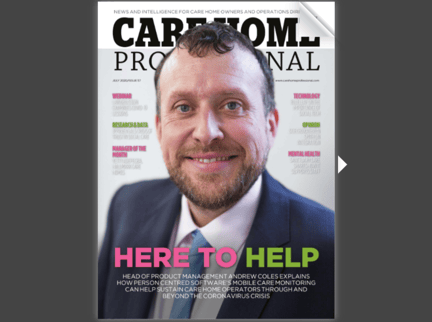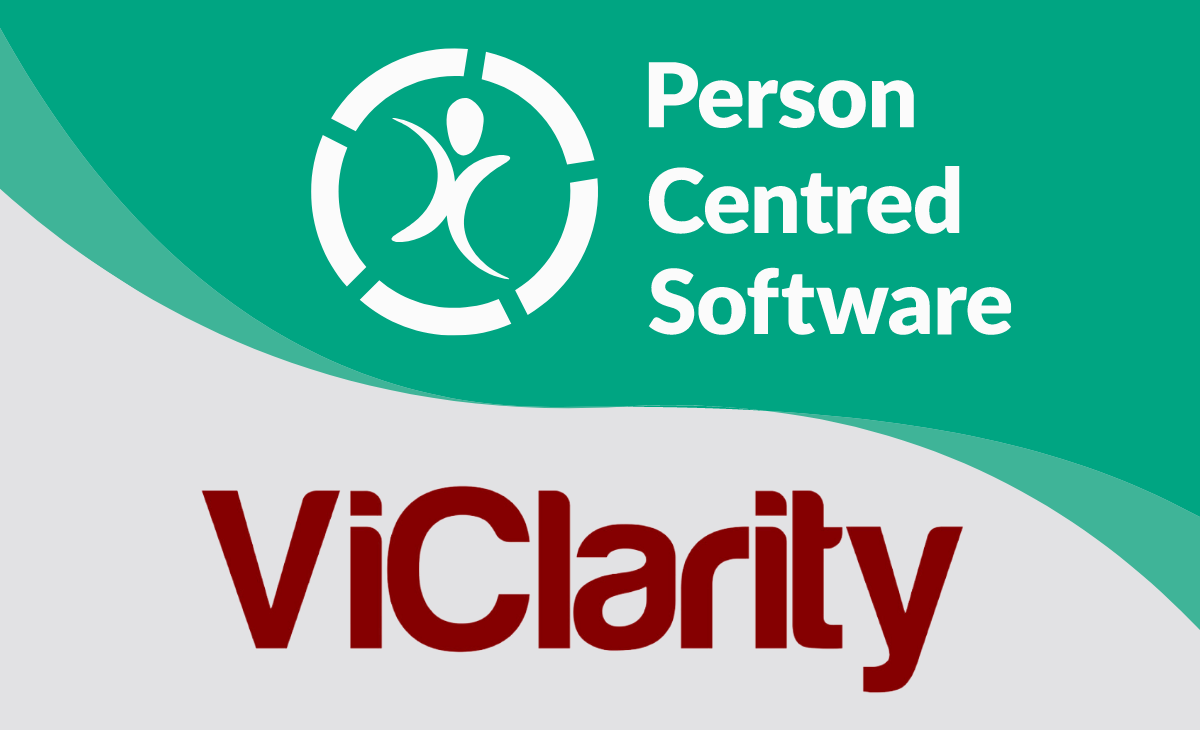
Published in Pages 21 - 25 Care Home Professional
With many care home operators facing an uncertain future due to a drop in occupancy and additional costs as a result of the coronavirus, digital technologies will play a vital role in ensuring they have a sustainable future.
Leading evidence based care system provider, Person Centred Software, has been offering vital support to operators during the current pandemic.
Andrew said Person Centred Software had been able to continue with its service provision without any disruption throughout the crisis thanks to its resilient Microsoft platform and its support and implementation team’s experience in working remotely.
“We have easily been able to upscale our remote implementation process,” Andrew told us. “We have also been able to continue to onboard new clients as well as provide additional content through webinars to our customer base so it’s been business as usual product wise.”
Due to lockdown the majority of functions such as development, support, sales, admin, onboarding and training being carried out remotely with only minimal hardware and distribution operations still conducted out Person’s Centred Software’s Guildford office.
All equipment is disinfected before being packaged up and quarantined after its delivery to care homes.
“Remote installation will be one of our new normals going forward,” Andrew told us. The head of product management said working remotely had streamlined installation processes which could now be carried out quicker for clients. Additionally, the MCM provider is able to provide a complete course of training remotely through webinar and online sessions.
Asked whether the crisis had affected demand from operators, Andrew said enquiries had been much firmer as clients had made the decision to go digital as a result of the additional pressures they were facing. He said Person Centred Software had seen a “huge increase” in enquiries for its Relatives Gateway system as relatives have sought alternative ways to keep in touch with their loved ones during lockdown.
The software supplier saw a 50% increase in Relatives Gateway usage during the height of the pandemic in April and currently has over 5,200 people using the system.
“Engagement with families is a really important part of everyone’s life,” Andrew noted. “It’s been particularly important at this time when families can’t go into homes and physically see their loved ones.”
A free video link service has been provided with the system during the crisis to allow greater communication between residents and their families.
Andrew also noted there had been a rise in enquiries from clients wanting to switch from other digital systems to MCM. “Maybe it has highlighted some issues with other systems out there and they are seeing the additional benefits of what MCM can do,” he observed.
Andrew added that the pandemic had also led to increased enquiries from clients seeking to make additional integrations with their existing digital systems.
Person Centred Software has been able to respond quickly with product updates to provide additional support to operators during the crisis.
New updates include an infections register that highlights residents who are self-isolating or receiving barrier nursing due to being suspected or diagnosed with COVID-19 so that carers can take additional precautions when providing care. MCM’s ability to track operational and risk data has also been a key support for operators.
The evidence based care system records occupancy levels as well as hours worked by staff so that managers can see where people are having to work more hours to cover shifts. Because the system is able to provide the information carers require at the point of care, it also helps provide continuity of care when agency staff are employed at a home.
“Agency workers are given an instant summary of the person they are caring for so that they can have a better picture of the individual and their needs,” Andrew noted.
“While COVID-19 is grabbing the headlines, people in care homes are still living with the same complex conditions such as dementia and a lot of that is about knowing the individual and the behaviours they might display. If someone providing support does not know that information they are not going to be providing the best quality of care. We provide that information in a really accessible and easy to use way.”
MCM has also offered benchmarking data so that operators have been able to plan more effectively.
“When we first started the crisis we could see that the government figures were not reflecting the true impact on care settings,” Andrew explained.
“We were seeing a three-fold increase in year-on-year deaths at the peak. There can also be a time delay between events occurring and their being reported in the government’s daily briefings, which makes it difficult for care providers to plan effectively. Because of this we decided to provide data for care providers to be able to benchmark themselves and see what is happening within the sector so that they can see whether things are improving and how long they will have to put their emergency plans in place.
“With MCM being part of a provider’s day-to-day process and the size and richness of our data, we can use the information captured to provide reliable insights into the industry without being a burden to users. The data is coming directly from the care that they evidence and support.”
Given the additional pressures being placed on carers during the crisis, MCM has also played a key role in helping maintain care quality by capturing real time information easily and quickly to support a resident’s care outcomes and needs.
MCM highlights medical risks to be aware of through hydration and nutrition tracking, as well as recording social activity and the outcomes from planned care to meet resident’s needs and to ensure the provision of a safe environment.
The software system also provides early indicators of when someone is becoming less well and in need of intervention by monitoring vital signs such as blood pressure and respiratory rates.
A coronavirus action icon has also been added to the system to allow staff to record any symptoms displayed by residents. These vital indicators can be quickly and easily entered on mobile devices and produce observation charts that are vital for hospital admissions and during handovers.
By eliminating time spent on paperwork, MCM also helps overstretched carers spend more time providing person centred care to residents. The software also supports effective communication during handovers by making the process simpler and ensuring things are not forgotten.
Serious concerns have been raised during the coronavirus crisis regarding the end of life care of residents who have often been sadly unable to be with their loved ones when passing. Further concerns have been raised by pressures to adopt blanket Do Not Resuscitate orders for the elderly during the height of the crisis.
MCM helps ensure staff have the information they need to best support someone approaching end of life through its Advance Care Plan which records residents’ wishes.
“It’s about giving that comfort to resident’s families that their loved one is still receiving the best possible care right until their end of life and beyond in making sure their after death wishes are respected and understood,” Andrew noted.
MCM also helps improve the care journey between health and social care services, another area where stress points have been exposed during the crisis.
Person Centred Software provides a hospital pack for residents containing information around their current situation, what the reason for their escalation is and what the concern and response has been. The pack also contains information on the individual’s preferred place of care.
“It’s about maintaining that continuity of care as that person goes from one care setting to another,” Andrew stressed.
“The more information you have about someone’s wellbeing, wishes, baseline and indicators, the more confident care providers can be to make decisions as to where the best care can be provided and to respect resident’s choices and wishes. When communicating with health services and enabling remote access from GPs, our customers can paint an accurate picture of the situation and support tele health/care.”
While noting that the health and social care systems were never designed for sharing information, Andrew highlighted how Person Centred Software was playing a key role in developing more effective communication going forward.
The software supplier took part in the NHS Demonstrator project which has shared information between care homes and hospital directly. Person Centred Software is also currently engaged in multiple NHS Pathfinder projects that are developing a digital standard for sharing information between health and social care services.
While conceding that services remained at the start of their journey towards digital integration with care transfer information still shared in paper form, Andrew highlighted that this information was still rich in data and contemporaneous when provided by a system such as MCM.
“We have seen ambulance crews and the CQC comment on the quality of our information for hospital admissions,” Andrew noted.
The product management head also welcomed investment by NHS Digital into changing the paper norm in services.
“It’s great to be part of that and the future looks brighter from that perspective,” he said. “It’s so critical that information is shared so that person’s journey is improved.”
Andrew added that it had been good to see some of the hurdles to the wider interoperability of health and social care relaxed.
He noted that as a founding member of CASPA, a UK association created to facilitate and promote the use of digital technologies in social care, Person Centred Software had finally been able to get the sector’s voice heard.
Looking ahead, Andrew stressed that Person Centred Software saw itself very much as part of a larger network of support, engaging with various technology suppliers as well as industry professionals and leaders.
“We believe we have a responsibility to the sector as a whole, whether that is through signposting providers to trusted partners who can offer a range of products and services, collaborating to produce downloadable content, or championing social care itself,” Andrew said.
“The benefits of this approach are that providers are able to choose the right combination of products and services, and partner with a supplier that is continually investing and improving, and one that is really focused on being the best of bread solution with the sector at its heart.
“We believe this approach results in our customers having the right tools for the right job and is designed with them in mind. We don’t want to be a jack of all trades and master of none. We want to continue with our focus because that’s got us to being a trusted and dedicated market leader.”
Looking at its roadmap ahead, Andrew said Person Centred Software would continue to focus on working with its partners to champion digital technology as an enabler for the ‘care home of the future’ and to collaborate on projects that can harness the power of combining solutions.
“As the uptake of digital matures in social care, customers will be looking for further advancements with MCM as a central hub,” Andrew noted.
He highlighted remote monitoring, where technology can enable 24/7 monitoring of an individual where staff can’t physically be present, as an area Person Centred Software was seeking to partner with another supplier.
“As technology becomes the norm I think we will see an acceleration in these additional technologies being added onto the customer’s ecosystem of care,” Andrew told us.
He said the coronavirus crisis would accelerate digital take up going forward as operators seek to become more efficient and provide higher care standards in order to ensure their sustainability.
“Rightfully so, the immediate impact for the sector was to focus on their initial response to the crisis,” Andrew noted.
“In a crisis situation your mind is focused on what is really going to make a difference and provide value and drive quality of care, reduce risk and provide efficiencies.
“Care homes are a vital part of health and social care, those living in care homes need support and staff working in these setting have really shown that they are willing to go the extra mile, but they need the right systems to support them – so I think we will see I rise in providers investing in digital care planning and monitoring.
“We have seen a shift in mindset from those providers that have been previously tentative and maybe putting off their dive into digital to wanting to act with expediency.”
While acknowledging that some care home providers may be forced to close by the current crisis, Andrew said the main sentiment of the sector would be ‘the show must go on’ after the getting over the initial response to COVID-19.
When asked where digital care systems should sit in terms of priorities for care home operators where room for investment in technology may be at a premium, Andrew said: “Digital care planning and monitoring should be a priority in terms of technology because it’s that central hub of information.
“It’s the heart of their business in terms of what their teams are doing every single day in terms of supporting their residents by executing that care plan effectively. It’s the essential cog in the solution and other technologies are things you build on top of that. If they have not gone on a digital route then digital care planning is a natural first step to take because it underpins everything.
“Without digital care planning, operators’ chances of survival will be much lower. If they haven’t got the staff resources they used to have, they have to make sure what they do have is as effective and safe as possible so they can continue. They see our technology as an investment and not as a cost as without it they can’t plan their businesses.”
In an uncertain climate, Andrew said choosing the right technology partner who would be around for the long term was key for care home operators.
“We are in a fortunate position that our footprint means that our service has been uninterrupted during this period, so we have also been able to keep on all our team,” he noted. “Sure, we have had to adapt our way of working but technology itself has meant this has been a smooth journey for us.
“The volumes of data we process and the intelligence this can provide mean that we are in a unique position to build innovative tools that can enable a proactive response and early intervention.”
With sustainability the key issue facing care home operators as they plot their way through and beyond the coronavirus crisis, Andrew said Person Centred Software could play a key role in ensuring their survival.
“We’ve invested time and money into our technology, architecture, platform and product because we know it takes this to be able to provide a service fit for the sector and the current crisis has proven that we made the right decisions,” he said.
“We shall continue investing and our position as market leaders comes with a responsibility to ensure that we continue to provide value to those who use our service and provide them the intelligence and the infrastructure to make digital an enabler to make decisions to ensure they survive, bounce back and grow.”
In concluding, Andrew said the day when digital care would be the new normal was fast approaching.
“Digital care will no longer be seen as a nice to have, but be an essential part to enable the sector to grow and thrive, working alongside health services in stature and investment,” he said.







.webp?width=80&height=80&name=HTD%20Awards%202023%20Badge%20(4).webp)














